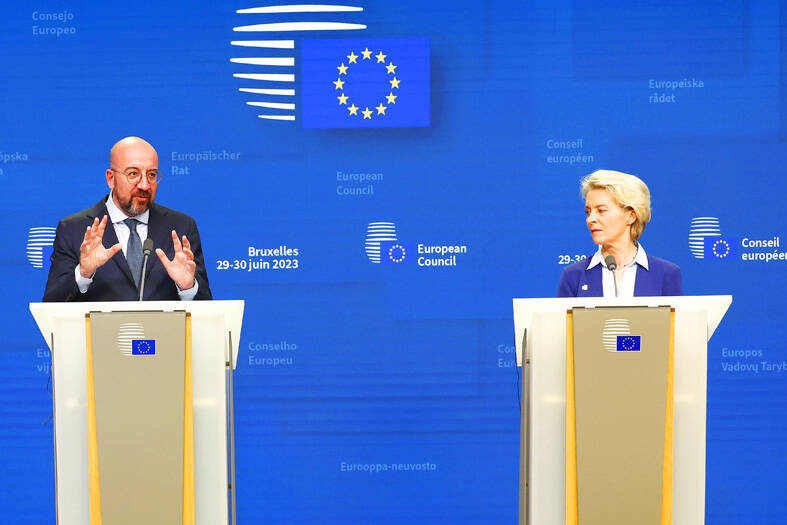EU leaders on Friday took a stance on cross-strait issues between Taiwan and China for the first time, saying during a summit that they are against any unilateral moves to change the “status quo.”
The East and South China seas are of strategic importance for regional and global prosperity and security, and the EU is concerned about growing tensions in the Taiwan Strait, the leaders said in conclusions issued after the two-day European Council meeting.
“The European Council opposes any unilateral attempts to change the status quo by force or coercion. It reconfirms the EU’s consistent ‘one China policy,’” the leaders’ statement said.

Photo: AP
In addition, the EU expressed concerns about how China handles human rights issues, including forced labor, the treatment of human rights defenders and minorities, the situations in Tibet and Xinjiang, and the honoring of its previous commitments related to Hong Kong.
In the statement, the leaders reiterated the EU’s multifaceted policy approach toward China, which they said was simultaneously a partner, competitor and systemic rival.
With that in mind, the bloc would continue to engage with China to tackle global challenges and would encourage Beijing to take more ambitious action on climate change, biodiversity, pandemic preparedness and humanitarian assistance, among other issues, it said.
The EU would also seek to ensure a level playing field with China, so that trade and the economic relationship can be balanced, reciprocal and mutually beneficial, the leaders said.
Meanwhile, the 27-member bloc would continue to reduce critical dependencies and vulnerabilities on China, including on its supply chains, and would seek to “de-risk and diversify where necessary and appropriate,” they said.
In Taipei, the Ministry of Foreign Affairs yesterday thanked the European Council for publicly voicing its support for cross-strait peace and stability over the past few months, while opposing the use of force to unilateral change the “status quo” in the Strait.
Taiwan would continue to deepen exchanges and cooperation with EU members and like-minded democratic partners and jointly safeguard regional peace, stability and prosperity, it added.

The US government has signed defense cooperation agreements with Japan and the Philippines to boost the deterrence capabilities of countries in the first island chain, a report by the National Security Bureau (NSB) showed. The main countries on the first island chain include the two nations and Taiwan. The bureau is to present the report at a meeting of the legislature’s Foreign Affairs and National Defense Committee tomorrow. The US military has deployed Typhon missile systems to Japan’s Yamaguchi Prefecture and Zambales province in the Philippines during their joint military exercises. It has also installed NMESIS anti-ship systems in Japan’s Okinawa

TRAGEDY STRIKES TAIPEI: The suspect died after falling off a building after he threw smoke grenades into Taipei Main Station and went on a killing spree in Zhongshan A 27-year-old suspect allegedly threw smoke grenades in Taipei Main Station and then proceeded to Zhongshan MRT Station in a random killing spree that resulted in the death of the suspect and two other civilians, and seven injured, including one in critical condition, as of press time last night. The suspect, identified as a man surnamed Chang Wen (張文), allegedly began the attack at Taipei Main Station, the Taipei Fire Department said, adding that it received a report at 5:24pm that smoke grenades had been thrown in the station. One man in his 50s was rushed to hospital after a cardiac arrest

‘WIN-WIN’: The Philippines, and central and eastern European countries are important potential drone cooperation partners, Minister of Foreign Affairs Lin Chia-lung said Minister of Foreign Affairs Lin Chia-lung (林佳龍) in an interview published yesterday confirmed that there are joint ventures between Taiwan and Poland in the drone industry. Lin made the remark in an exclusive interview with the Chinese-language Liberty Times (the Taipei Times’ sister paper). The government-backed Taiwan Excellence Drone International Business Opportunities Alliance and the Polish Chamber of Unmanned Systems on Wednesday last week signed a memorandum of understanding in Poland to develop a “non-China” supply chain for drones and work together on key technologies. Asked if Taiwan prioritized Poland among central and eastern European countries in drone collaboration, Lin

ON ALERT: Taiwan’s partners would issue warnings if China attempted to use Interpol to target Taiwanese, and the global body has mechanisms to prevent it, an official said China has stationed two to four people specializing in Taiwan affairs at its embassies in several democratic countries to monitor and harass Taiwanese, actions that the host nations would not tolerate, National Security Bureau (NSB) Director-General Tsai Ming-yen (蔡明彥) said yesterday. Tsai made the comments at a meeting of the legislature’s Foreign Affairs and National Defense Committee, which asked him and Minister of National Defense Wellington Koo (顧立雄) to report on potential conflicts in the Taiwan Strait and military preparedness. Democratic Progressive Party (DPP) Legislator Michelle Lin (林楚茵) expressed concern that Beijing has posted personnel from China’s Taiwan Affairs Office to its